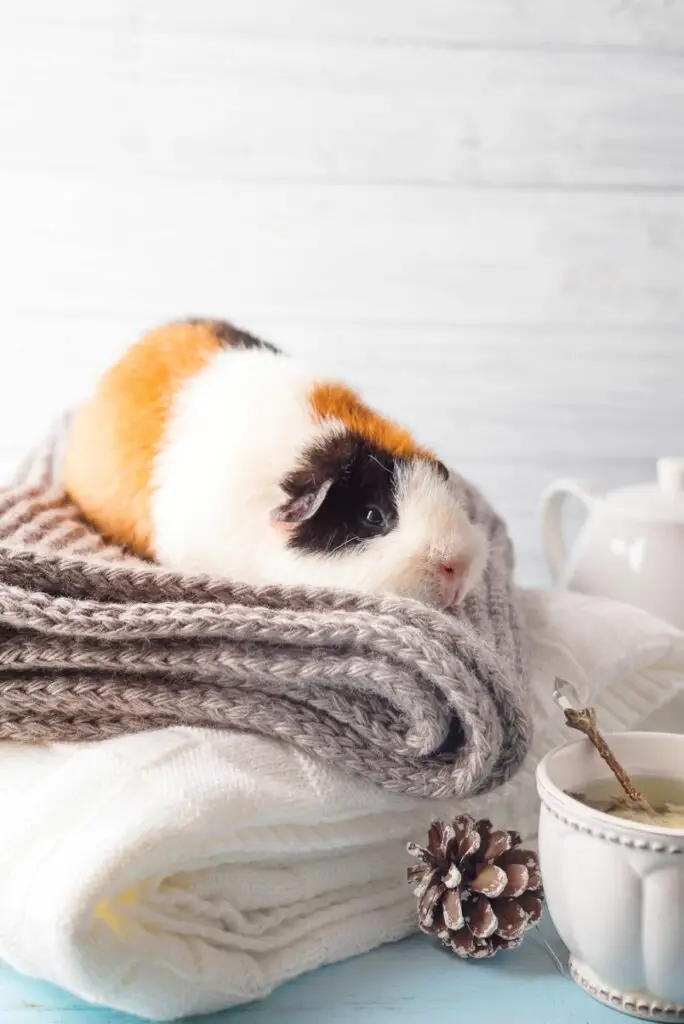Guinea pigs are furry, cute, and cuddly pets that are loved by many. They are sociable animals that love to play, run around, and eat. But have you ever wondered how they sleep? In this complete guide, we will talk about the sleeping habits of guinea pigs, types of sleep, factors that affect sleep, common sleeping positions, how much sleep they need, and sleep problems.

Sleeping habits of Guinea Pigs
Guinea pigs are small, herbivorous animals that are native to South America. They are also known as cavy, domestic cavy, or simply, guinea pig. They are social animals and are usually kept as pets. Guinea pigs have a lifespan of 4 to 8 years on average, but with proper care, they can live up to 10 years. They come in various colors, including white, black, brown, and gray.
Guinea pigs are crepuscular animals, which means that they are most active during dawn and dusk. They usually sleep for short periods during the day and night. Guinea pigs are light sleepers, and they are often on alert for any potential danger. They can sleep with their eyes open or closed, and they can easily be woken up by any noise or movement.
Types of Sleep
Like humans and other animals, guinea pigs also have two types of sleep: REM sleep and non-REM sleep.
REM sleep
REM (Rapid Eye Movement) sleep is a stage of sleep where the body is paralyzed, and the brain is active. During this stage, the eyes move rapidly, and the brain processes information from the day. Guinea pigs can have REM sleep, but it is not as prominent as in humans and other animals.
Non-REM sleep
Non-REM (Non-Rapid Eye Movement) sleep is a stage of sleep where the body is in a state of rest. The heartbeat and breathing slow down, and the body temperature drops. Guinea pigs spend most of their sleep time in non-REM sleep.
Factors that Affect Sleep in Guinea Pigs
Several factors can affect the sleep of guinea pigs, including age, environment, and diet.
Age
Young guinea pigs need more sleep than adult guinea pigs. As they grow older, they need less sleep, but they still need a minimum of four hours of sleep per day.
Environment
The environment of guinea pigs can affect their sleep. They need a quiet and comfortable place to sleep, away from any noise or disturbance. A cozy and warm bed can help them sleep better.
Diet
The diet of guinea pigs can also affect their sleep. They need a balanced diet that is high in fiber, vitamins, and minerals. Avoid feeding them sugary or fatty foods, as it can affect their sleep.
Common Sleeping Positions of Guinea Pigs
Guinea pigs can sleep in different positions, depending on their comfort level and mood.
Curling up
Curling up is the most common sleeping position of guinea pigs. They curl up into a ball with their paws tucked under their body, and their head resting on their paws.
Stretching out
Guinea pigs also love to stretch out while sleeping. They lie on their side with their legs stretched out and their head resting on their paws.
Side sleeping
Side sleeping is another common sleeping position of guinea pigs. They lie on their side with their legs tucked under their body and their head resting on their paws.
How Much Sleep Do Guinea Pigs Need?
Guinea pigs need a minimum of four hours of sleep per day, but they can sleep up to 10 hours per day. They usually sleep for short periods during the day and night.
Sleep requirements for guinea pigs
Guinea pigs need a quiet and comfortable place to sleep, away from any noise or disturbance. A cozy and warm bed can help them sleep better. They also need a balanced diet that is high in fiber, vitamins, and minerals.
How to ensure your guinea pig gets enough sleep
To ensure that your guinea pig gets enough sleep, provide them with a quiet and comfortable place to sleep. Make sure that their bed is cozy and warm. Keep them away from any noise or disturbance. Provide them with a balanced diet that is high in fiber, vitamins, and minerals.
Sleep Problems in Guinea Pigs
Guinea pigs can experience sleep problems, just like humans and other animals.
Insomnia
Insomnia is a sleep disorder characterized by difficulty falling asleep, staying asleep, or both. Guinea pigs can experience insomnia due to stress, illness, or discomfort.
Nightmares
Guinea pigs can have nightmares, just like humans and other animals. They may wake up suddenly, looking scared or agitated.
Sleepwalking
Sleepwalking is a sleep disorder characterized by walking or performing other activities while asleep. Guinea pigs cannot sleepwalk, but they can twitch or move their legs while sleeping.
Conclusion
In conclusion, guinea pigs are adorable pets that need enough sleep to stay healthy and happy. They sleep for short periods during the day and night, and they can sleep in different positions, depending on their comfort level and mood.
To ensure that your guinea pig gets enough sleep, provide them with a quiet and comfortable place to sleep, away from any noise or disturbance. Provide them with a balanced diet that is high in fiber, vitamins, and minerals. If you notice any sleep problems in your guinea pig, consult your veterinarian for advice.
- How Long Do American Eskimo Dogs Live? Important Factors and Care Tips - September 29, 2023
- Do American Bulldogs Need Grooming? Essential Tips and Care Guidelines - September 29, 2023
- Do Bengal Cats Enjoy Playing? Essential Tips for Keeping Them Active - September 29, 2023